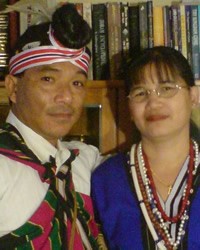Daai in Myanmar (Burma)

Photo Source:
Anonymous
|
Send Joshua Project a map of this people group.
|
| People Name: | Daai |
| Country: | Myanmar (Burma) |
| 10/40 Window: | Yes |
| Population: | 43,000 |
| World Population: | 43,000 |
| Primary Language: | Chin, Daai |
| Primary Religion: | Christianity |
| Christian Adherents: | 95.00 % |
| Evangelicals: | 60.00 % |
| Scripture: | New Testament |
| Ministry Resources: | Yes |
| Jesus Film: | No |
| Audio Recordings: | Yes |
| People Cluster: | Kuki-Chin-Mizo (Zo) |
| Affinity Bloc: | Tibetan-Himalayan Peoples |
| Progress Level: |
|
Identity
The Daai have appeared on official lists of ethnic groups in Myanmar since 1890. Among themselves they usually just go by the name Daai. “Chin” is believed to be a name meaning “basket,” given by the Burmese who first came to the remote mountains and saw women carrying baskets on their backs. The dozens of Chin tribes have never actually used that name for themselves when speaking their native languages.
Location: More than 43,000 Daai people are distributed throughout more than 140 villages in western Myanmar's Chin State, making them one of the largest tribes in the southern Chin Hills. They inhabit four townships within three districts in the far west of the country, near the juncture of Myanmar, Bangladesh, and India. In recent years, several hundred Daai people have fled the chaos in their homeland and moved to Malaysia, where they have faced terrible times as undocumented immigrants. Due to the unrest in Myanmar, an unknown number of Daai now live in refugee camps inside India and Bangladesh.
Language: Daai is a distinct language within the Tibeto-Burman linguistic family, although it shares a lexical similarity of more than 90 percent with Daa Yindu and 87 percent with Cho. Those groups consider themselves separate ethnicities, however, and do not accept the Daai label. Daai has three dialects. The Ethnologue notes: “The Daai varieties in Matupi Township have low intelligibility with the other varieties and should perhaps be considered a separate language.” The small Kaang tribe, who inhabit five villages in Matupi Township, use Daai as a second language.
History
Daai territory practically served as an independent state for centuries due to its inaccessible terrain, with villages hemmed in against towering mountains up to 10,500 feet (3,200 meters) high, separated by rivers and streams that flow through the gorges below. The independence enjoyed by the Daai Chin began to change after the British expedition of Chin State in 1890, leading to its full annexation and incorporation into the British Empire in 1897. The current Myanmar civil war, which erupted in 2021, has deeply affected the Daai region. Several armed militia groups, calling themselves the Chinland Defense Force, have combined to fight the Burmese junta, which many Chin see as an existential fight for their survival. After making strong progress, in December 2023, the Chin National Front ratified a new constitution and proclaimed the formation of the State of Chinland.
Customs
The Daai are a deeply impoverished tribe with few high schools or medical clinics. They rely on their agricultural skills to survive, planting crops before the onset of the monsoon each April and harvesting in October and November. Their main crops include rice, corn, beans, cucumber, pumpkin, eggplant, sweet potatoes, tomatoes, and ginger. Like other tribes in southern Chin State, the Daai traditionally tattooed the faces of young girls. Their designs are like those of the Daa Yindu, with long vertical lines across the entire face. Some have a series of dots, making them appear like leopards.
Religion
Until recently almost all Daai were animists, worshipping a myriad of deities, including a supreme being called M'hnamnu. The Daai are one of the last Chin tribes to turn to Christianity, as the Gospel was first preached to them in the 1970s. The number of Daai people converting to Christ gained momentum in the 1980s and 1990s.
Christianity
Today, almost all Daai people have seen the truth of the Gospel and have surrendered their lives to Jesus Christ. The Presbyterians, YMCA, and Assemblies of God are three of the Christian organizations among the Daai. Although they have had the New Testament since 1996 and the Jesus film, the full Daai Bible has yet to appear. The Daai believers find themselves living in tense times, but many have found internal peace, and their faith cannot be shaken.